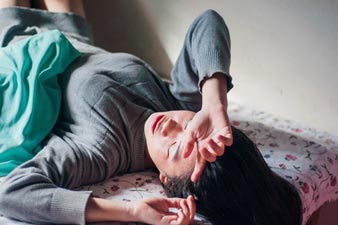Being unable to sleep at night is quite frustrating and can even result in health problems.
Unfortunately, sleep issues are more common than you would think. As a matter of fact, over one-third of adults in the US report getting less than 7 hours of sleep in a 24-hour period. In addition, over 70 percent of high-school students report getting less than 8 hours of sleep on weeknights.
When you think of ways to get more sleep, the idea of getting poked with needles perhaps won’t enter your mind – but it probably should! Acupuncture – an ancient Chinese practice – has been associated with enhanced sleep and has also been shown to help treat insomnia.
Continue reading to learn more about acupuncture benefits for sleep issues.
What Does Research Say About Acupuncture Benefits for Sleep Issues?
There are several studies investigating the impact of acupuncture benefits for sleep issues. Here is what research says about acupuncture for various sleep disorders.
Primary Insomnia
Evidence suggests that acupuncture can benefit individuals with insomnia that cannot be attributed to any particular cause.
A small study in 2017 evaluated the safety and efficacy of acupuncture treatment for primary insomnia. The 72 participants suffering from primary insomnia either received actual acupuncture or sham acupuncture, where the needles were not inserted as deep into the skin. Participants were given treatment three times every week for a period of four weeks.
The results of the research revealed that acupuncture was more beneficial in alleviating insomnia-related symptoms, improving sleep efficiency, and increasing total time during the course of the treatment. In addition, people’s sleep awakening and self-rated anxiety also increased considerably two and four weeks post-treatment.
Sleep Apnea
A systematic review and meta-analysis of nine studies performed in 2020, including almost 600 people, discovered that acupuncture showed significant improvements in symptoms of sleep apnea, oxygen saturation levels, and ratings of sleepiness. This was particularly true among individuals with mild to serious cases.
Mental Health Conditions and Insomnia
A study conducted in 2020 involving 90 participants with insomnia and depression discovered that 3 weekly electroacupuncture (a kind of acupuncture that uses electric currents) sessions for 8 weeks helped improve:
- Sleep efficiency
- Sleep quality
- Depression
- Total sleep time
Such improvements were considerably higher as compared to placebo or sham treatment.
Chronic Pain and Insomnia
A review of nine studies in 2019 encompassing almost 1,000 individuals with insomnia caused by chronic pain found that acupuncture was more effective at enhancing sleep quality as compared to medication or sham treatment.
What Are Sleep Issues?
Sleep issues are a group of conditions that impact your ability to sleep well regularly.
Many individuals often experience sleeping issues due to hectic schedules, stress, and other external factors. Nevertheless, when these problems start to occur regularly and interfere with everyday life, they might be suffering from a sleeping disorder.
Depending on the kind of sleep disorder, individuals might have a tough time falling asleep and might feel excessively tired throughout the day. The lack of sleep can negatively impact concentration, mood, energy, along with their overall health.
Sleep issues can also impact your performance at school or work, cause strain in relationships, and compromise your ability to perform everyday tasks.
Types of Sleep Disorders?
There are several different kinds of sleep disorders. They are often categorized into groups that explain how they impact you or why they happen. The most common sleep disorders include:
- Insomnia – You might have trouble falling asleep or staying asleep through the entire night.
- Sleep apnea – You might experience abnormal breathing patterns while sleeping.
- Restless Legs Syndrome – Also known as Willis-Ekbom disease, Restless Legs Syndrome leads to an uncomfortable feeling and a longing to move the legs as you try to sleep.
- Narcolepsy – A condition where you might feel extremely sleepy during the day and fall asleep suddenly during the day.
Symptoms of Sleep Disorders
The symptoms of sleep disorders depend on the type and severity of the sleeping disorders. They might even vary if they are caused by another condition. Nevertheless, common symptoms of sleep disorders include:
- Daytime fatigue
- Trouble staying or falling asleep
- Unusual breathing patterns
- Strong desire to take naps during the day
- Unpleasant or unusual urges to move while falling asleep
- Unintentional changes to sleep and wake schedule
- Anxiety or irritability
- Unusual movement or other experiences while sleeping
- Poor concentration
- Depression
- Decreased performance at school or work
- Weight gain.
Causes of Sleep Disorders
There are several diseases, disorders, and conditions that can lead to disturbed sleep. In several cases, sleep disorders develop due to an underlying medical or health issue.
- Respiratory problems and allergies. Upper respiratory tract infections, allergies, and colds can make it difficult for you to breathe at night. Being unable to breathe through your nose can even lead to sleeping troubles.
- Frequent urination. Frequent urination might disrupt your sleep by waking you up at night.
- Chronic pain. Persisting pain can make it challenging to fall asleep or might even wake you up from your sleep. Here is a list of the most common causes of chronic pain –
- Persistent headaches
- Arthritis
- Persistent pain in the lower back
- Chronic fatigue syndrome
- Anxiety and Stress. Anxiety and stress can negatively impact sleep quality. You might not be able to fall or stay asleep. Sleepwalking, Sleep talking, or nightmares might also disrupt your sleep.
How Does Traditional Chinese Medicine View Sleep Issues?
In traditional Chinese medicine (TCM), it is believed that, along with the presence of external factors impacting the emotions and mood, insomnia might also be caused by poor blood circulation, lack of nutrients in the body, or possibly incompatibilities or inconsistencies between related internal organ functions such as the kidneys, spleen, gallbladder, heart, and liver.
Last Few Words
If you are suffering from sleep issues, you should definitely look into acupuncture to get a good night’s sleep.
At the American College of Acupuncture & Oriental Medicine (ACAOM) Main Clinic, we specialize in offering treatments that allow you to sleep comfortably through the night. Schedule an appointment with us for a consultation at 713-780-9786. ACAOM also offers acupuncture treatments at Houston Methodist Hospital at 713-441-5980.
 Our Degree Programs
Our Degree Programs